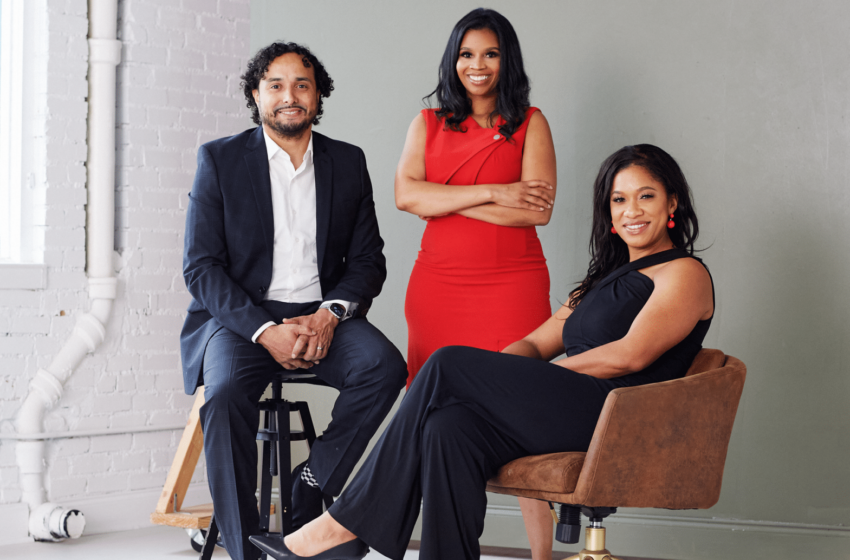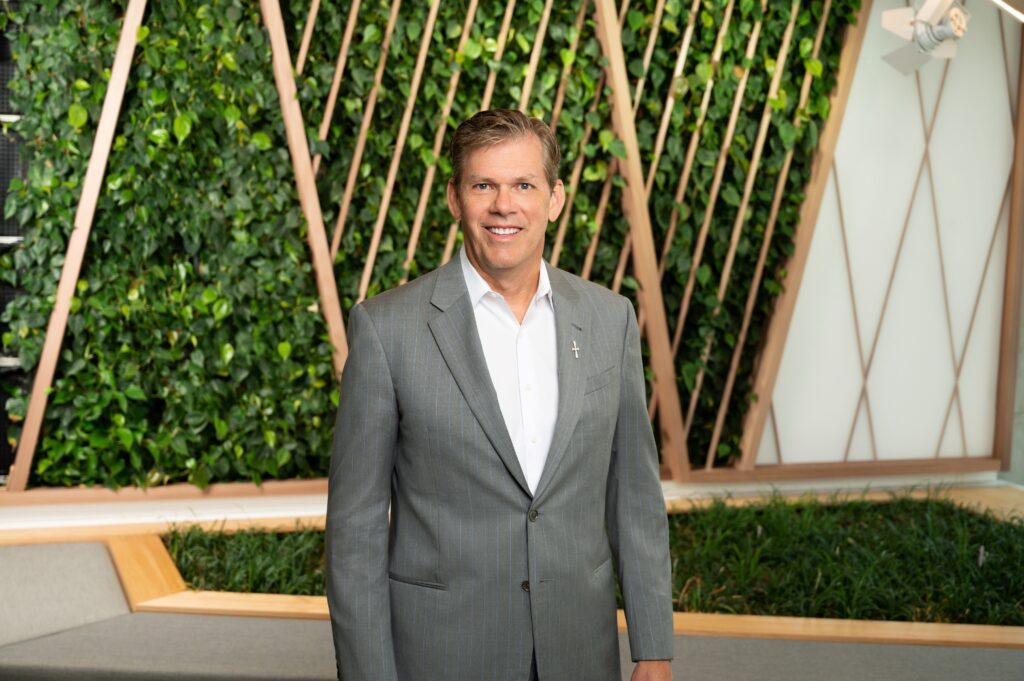A Data-Driven Approach to DEI

The founders of Dallas-based Kanarys explain how they’re helping leaders measure progress toward more diverse and equitable organizations.
In the past year and a half, CEOs across the United States have been newly focused on diversity, equity, and inclusion (DEI) efforts. But long before that, the three cofounders of Kanarys—Mandy Price (CEO), Star Carter (COO and General Counsel), and Bennie King (Chief Product Officer)—were innovating on how to make organizations more diverse, equitable, and inclusive in data-driven and tech-enabled ways. Today, their Dallas-based company, Kanarys, is a leader in this growing space. Together, they’re bringing artificial intelligence, machine learning, and natural language processing to provide data that bears on long-entrenched DEI challenges within their clients’ organizations, creating more diverse and inclusive work environments for all.
Price, Carter, and King attended UT Austin together, before Price and Carter went on to attend Harvard Law School and then to work at the same law firm. Since 2018, the trio has been back together, building Kanarys in the Dallas-Fort Worth area. In January, Kanarys closed its seed round, bringing its total amount of capital raised to $4.6 million. It was a challenge, as Price explained to us, but also a historic achievement: It put Price and Carter among the only 93 Black women who have raised over $1 million in VC funding.
We spoke with the Kanarys cofounders, in turn asking them questions that relate to their specialty within the organization. They shared their company’s journey to success, how diversity impacts the bottom line, why data and benchmarking are integral to any DEI program, and their advice for CEOs on DEI.

Mandy Price
Cofounder & CEO
How did you come about founding Kanarys? How did you and your cofounders meet each other?
My cofounders and I started Kanarys in 2018 because we knew that data could help solve diversity and inclusion issues and inequities. Given our experiences, we knew we could build a technology platform to solve this for employees and companies everywhere. We saw a breakdown in communication, even at well-meaning companies, and we wanted to provide companies with the necessary diversity, equity, and inclusion [DEI] data to implement a meaningful strategy.
Star, Bennie, and I shared many experiences with other Black individuals, both in and out of the workplace. Specifically, I was called the “diverse partner” by a colleague and asked if I had gotten into Harvard legitimately. Needless to say, that made me feel undervalued and like a token. Instances like this told me I needed to create change and work toward a better future for my children. I knew I had to help workplaces examine the way they do things at a foundational level, which is how Kanarys was born.
Where did the name Kanarys come from?
The name was inspired by a book by one of my professors, Lani Guinier, called The Miner’s Canary. It addresses systemic racism and how society must confront it in the twenty-first century. Additionally, the Kanarys name is also based on the use of canaries in coal mines to detect if the environment was safe and healthy to work in. With our platform, we are doing the same thing by serving as a first alert for DEI issues in the workplace. By detecting potential issues early, we allow our clients to be proactive instead of reactive with their DEI efforts.

What’s your advice for CEOs who are looking to build a more inclusive work culture but don’t know exactly where to start?
My biggest piece of advice is to hire a DEI expert who is focused on a data-based approach to determine what strategy addresses the specific needs of your company. DEI isn’t a one-size-fits-all approach. Most companies want a quick Band-Aid when they really need an X-ray along with a prescription that addresses what’s really going on inside their workplace.
The other thing I’d say is that data should be an integral part of every DEI approach. Having clear data allows companies to create measurable KPIs that can be tracked and improved, not only by HR leaders but by C-suite executives and managers throughout the organization. This allows people to make informed decisions around DEI efforts.
When you look at the number of women and people of color among CEOs in the US, you see that we have a lot of work to do around diversity, specifically in the CEO role. Why do you think we’re lagging here?
Currently, there are only 40 women running Fortune 500 companies, with only two of them being Black women, Roz Brewer [CEO of Walgreens] and Thasunda Brown Duckett [CEO of TIAA]. Further, 70 percent of senior executives are white men. This is a major problem, because companies cannot possibly innovate or understand all consumers or their employees if they are not represented at the decision-making table.
What would you say to a CEO who doesn’t believe that DEI is a priority in their own company right now?
Not only is having a diverse, equitable, and inclusive workplace the right thing to do—it also makes good business sense. According to McKinsey, companies that are ethnically and culturally diverse are 36 percent more likely to have greater financial returns than industry medians and are more likely to radically innovate. In 2021, we’ve seen more companies turn to DEI metrics as a key performance indicator (KPI) for their company’s success, signaling the shift in attitude towards DEI as a critical indicator of strength.
A strong DEI strategy is also essential to hiring and retaining top-tier talent. Many young job seekers see DEI as an absolute requirement to work for a company. In fact, a recent survey showed that 83 percent of Gen Z candidates said that a company’s commitment to diversity and inclusion is important when choosing an employer.
How would you describe the current business environment in Dallas? Have you found any advantages to being headquartered there, or in Texas more broadly?
I was born and raised in the Dallas-Fort Worth area, and I had a legal career here in Dallas before I started Kanarys. Because of this, I knew the strength of the DFW business community and was excited about launching Kanarys in such a great market. For many years, DFW has been recognized as one of the fastest-growing regions in the country. Plus, in Texas, the cost of doing business is 3 percent lower compared to the national average, and we have no corporate income tax.
However, once I began fundraising for Kanarys, I realized that for such a strong market, Dallas had more work to do in terms of supporting their many talented entrepreneurs, specifically underrepresented and female entrepreneurs. My cofounders and I faced these challenges head-on, understanding that while we were mostly offered mentorship from potential investors, what we really needed was capital. Despite these challenges, my cofounders and I closed our historic $3 million seed round in January 2021, which brought our total amount raised to $4.6 million to date.
Bennie King
Cofounder and Chief Product Officer
What is the experience of using the Kanarys platform like?
The platform gives clients all the data they need to implement a meaningful DEI strategy, using artificial intelligence, machine learning, and natural language processing. We also conduct DEI systems assessments of an organization’s talent acquisition, retention, performance reviews, and pay practices, and we provide a DEI report card that shows internal and industry benchmarks. That makes it very clear where the company stands in terms of diversity, equity, and inclusion.
How does the technology side help people create systemic change in their organizations?
In our work in DEI, one of the biggest barriers is that there is little substantial data to show organizations what needs to be done and how they can create a benchmark for themselves. DEI has not typically had the same metrics and resources as other business units. It’s been seen as subjective, but we know that it is important to have metrics just like we do for every other business unit. We developed an algorithm that tracks and combines all the data points to create an index measuring our clients’ DEI. It’s a tool to support the company’s growth and a true measurement based on quantitative and qualitative data.

With this data, leaders can make informed decisions when it comes to DEI. Additionally, with DEI, the latter two [equity and inclusion] are the hardest to measure, but with a technology solution, you’re able to measure all three, while also internally benchmarking progress over time. That means you can create a workplace where all employees feel like they belong.
Star Carter
Cofounder, COO & General Counsel
What’s the most common mistake or misunderstanding you see when companies engage in DEI programs?
The most common mistake when it comes to DEI programs is that the thought process typically stops at the “D” for diversity. But a great work environment takes into account equity and inclusion as well, doing so intentionally and carefully. Equity is essentially leveling the playing field for every employee and making sure each employee has a fair shot at being successful. Equity can often be addressed by making sure policies, procedures, benefits, hiring practices, and pay scales are fair. Inclusion, simply put, is more about if your employees feel welcomed, heard, embraced, and respected in the workplace—no matter who they are. While it’s the toughest to measure, inclusion is incredibly important in keeping your employees motivated.
Another common mistake is that many organizations immediately think of training when they think about diversity and inclusion. There’s nothing inherently wrong with training, but we know that training alone does not solve DEI issues. Leaders must include a larger, longer-term strategy that looks at DEI from a systemic standpoint. Additionally, companies should do training relative to the issues that have been identified in their workplace. Everyone knows the term unconscious bias, so we see many organizations say “We need unconscious bias training” when they probably need training focused on another specific DEI topic. When companies focus on the training aspect, they’re often not pulling together the whole strategy necessary to move these issues forward.
Additionally, we are seeing companies appoint Black or underrepresented employees as DEI chairpersons—placing the burden on them to run DEI initiatives like hosting quarterly DEI trainings or establishing DEI committees. However, in order for real change to take place, company leadership needs to make this an integral part of their overall business strategy and address DEI issues at their core.
What is your strategy around bringing talent into Kanarys? What do you look for in employees when you’re recruiting?
Since the COVID-19 pandemic transitioned us to a fully remote team, our hiring practices for our rapidly growing team have shifted. For one, we now have several team members who we have never met in person before. We’ve been open to remote work even before the pandemic, but with people embracing working remotely since the pandemic, it’s allowed us to further expand our talent pool outside of the DFW area, growing our geographic footprint and reach and allowing us to find the top candidates for our open positions.
The most important thing we look for when hiring is someone who’s passionate about our mission and the work we do. We find that those who are aligned with our mission are folks who have experienced inequities in the workplace themselves, which fuels their motivation to build Kanarys and help create workplaces where everyone belongs. We have employees who could never reveal their partner at their old jobs, so it is very rewarding to work toward a world where everyone can feel free to be their authentic selves.







1 Comment
great vision, great founders!